|
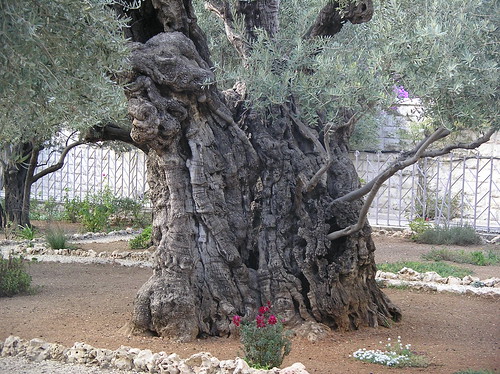
Olive tree, Garden of Gethsemane.
(*photo by Randall Niles, Creative Commons)
A note of thanks.... To our 2013 Earth Healing supporters .
You make this website possible!
January 1, 2014 How Can We Make This a Day of Peace?
Each First of January seems much the same in our daily routine, unless we choose to make it a special event. New Year's Day is more than a midnight countdown; uniqueness occurs with a surging sense of hope that this can be the initiation of the best of times. The Messiah appears on the octave day of Christmas and we celebrate with the Prince of Peace. While global peace is not yet established, it is our hope that this could be the year when it comes to be. We reaffirm our willingness to help embrace, proclaim, and pray for world peace. We are reminded that 2014 is the one hundredth anniversary of the beginning of the Great War -- to end all wars. Its incompleteness haunts us all.
Embrace peace. We start within our hearts, though mindful of troubles outside ourselves. If we look within we see the incompleteness of peace in our entire being. The challenge for us is to make this day of peace a reality, to seek to resolve our unfinished inner conflicts and to do so here and now. We are challenged to overcome our restlessness by reaffirming our goals with God's help. We declare once more that we will do the best we can and simply admit our limitations. Those strained relationships will improve, even with the rough edges shown to loved ones, next door neighbors, and the environment all about. Yes, we can live more simply, take more care of how we are and what we say. And we can exercise a little more on cold winter days.
Proclaim peace. We share together a growing sense of craving peace but are all too often quite quiet about it. Recalling the 1914 naive adventures of flag waving and marching to battle is hardly helpful. Slaughter and bloody, muddy trenches followed. All too often a silent but noble call for peace says: less militarism and more concern about addressing hunger; fewer F35s and more resources directed to improving the global infrastructure. This universal yearning for peace means beating swords into plowshares. The world of immense military spending (57% of an American budget now under attack) must be part of pruning the budget, since there are millions in need of accessible housing, nutritious food, formal education, proper health care, and environmental preservation. Why all the sophisticated weaponry? Why does the military/industrial complex dictate our policies?
Pray for peace. We pray for peace throughout the world and especially in Syria, Afghanistan, South Sudan, Egypt, Palestine, and every hot spot on the globe. Prayer is the least and most that we can do. We are unable to make peace alone; we pray that others join us in our Earth-circling embrace. We are all so addicted to materialistic endeavors and cannot pull ourselves up by the bootstraps. Levitation is hardly our gift. Only the Lord can raise us from the mud that sucks us down in our human-generated quagmire. In God alone we trust.
Prayer: Lord, give us the courage to plan ahead; inspire us to join others in bringing peace to our troubled world.
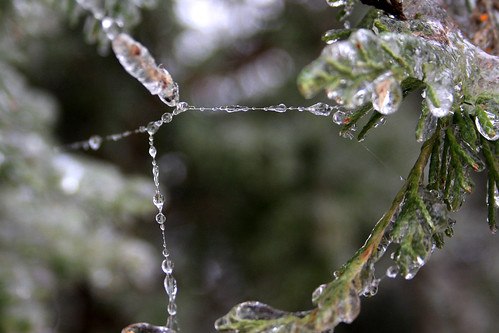
A delicate web of ice.
(*photo credit)
January 2, 2014 Should We Keep This Website Operating?
For ten year ending yesterday Earth Healing, Inc. has operated a website incorporated as a non-profit in the Commonwealth of Kentucky. This website has received over 75,000,000 recorded hits (reached on December 26th) and perhaps an equally sizeable number of unrecorded ones as well. Records show reception in 110 countries on a monthly basis over the past decade.
Along with a wide variety of environmentally related texts, much credit is due to our website manager Janet Powell, furnishing pertinent beautiful photos to accompany the words for each day from April 2007. People comment on topics and sometimes request us to take up their favorite themes. However, publicizing these comments would take us into a realm that requires far more resources than what we have available. We strive to show environment in a balanced manner while aware how misdeeds hinder a higher quality environment, and how conflicts fracture the solidarity so needed today. Earthhealing is not the domain of the concerned alone; it needs to be a global practice.
We raise the issue that we introduced last spring and that is whether we ought to continue this service. It is not always easy -- though a very satisfying -- work continuing week after week and never once being late during the decade. We ask again, "Should we continue the Daily Reflections with its photos and its retrieval calendar?" Certainly this website allows us to go out to all the world, but are we so taken for granted that we ought to allow others to take our place? And if they do, will they be drawn to the temptation to merely tweak our dysfunctional system hoping vainly to make necessary changes? Should this go unchallenged?
These questions raise the issue of our interior sense of duty and devotion. We receive little financial support and even perhaps some quiet hostility because of our critique of the current economic system. Why are there billionaires in a world of destitution and unfair taxes amid arenas of lower-income struggles? We strive to present the current environmental crisis as one of lack of willingness to make profound changes needed by our wounded Earth. Instead of daily reflections, should we devote more time in 2014 to the upcoming book "From Contrasumers to Revolutionaries?"
Let's step back and thank our readers for their interest, loyalty, support, and positive comments. Recall that our limited resources show that the poor are called to rise and lead. Special thanks to our Earthhealing team who faithfully ensure that the materials get out on time. We are not perfect, but that is what we say about the world also. We don't apologize for much of 2013, but rather recommit ourselves for as high a standard as we can muster. While many other websites have blossomed in the past decade along with Facebook and Twitter, we continue to grow amid greater competition -- and that gives us cause for enthusiasm.
Prayer: Lord, help us see our way and those who can help us.
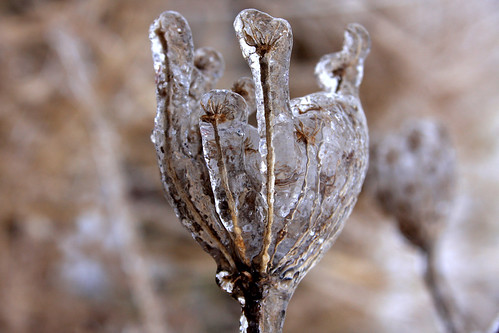
Kentucky ice storm, 2009.
(*photo credit)
January 3, 2014 Suggestions to Prepare for Winter Emergencies
Appalachians open a persimmon seed and look inside. If the image on the seed is a spoon it will snow heavily this winter, if a knife it will be icy, and if a fork it will be more or less mild. What do you find this year -- if you trust such folk practices?
* Be ready for utility failure. We could experience the breakdown of electricity or telephone (for the non-solar, non-cell phone user). Being without electricity is serious in a world depending on lights, heat, cooking, and computer. Keep a supply of potable water on hand; have a battery operated intensive light and radio; keep a mechanical can opener and extra blankets on hand.
* Store a backup heater. This is needed to keep pipes from freezing. Be especially careful when using a kerosene or other combustible heater. Vent emissions properly.
* Stay put and keep a positive attitude. It is always good to have available a little unfinished work project and reading material to endure emergency conditions in a peaceful manner.
* Dress warmly. This is not a time to risk getting a cold or chill. Many prefer heating the domestic space far too high and compound emergencies with health problems. When venturing outside, stay well dressed and wear good shoes for traction.
* Check on the welfare of neighbors, especially the shut-ins and elderly. Have enough supplies to share with them through the emergency period. An ice-covered automobile is a challenge to deice and make ready for emergencies. For cars that are not protected by a garage, only keep a door unlocked if the vehicle does not have a warning light that continues to burn while parked.
* Drive with super care. Sometimes we must venture out to assist another and know that ice and especially "black ice" can prove fatal, as happened to one of my young parishioners in 2009.
* Store ample ready-to-eat food that is both healthy and satisfying (canned vegetables, crackers, peanut butter, canned fish, citrus and other fruit, raisins, prunes and dried cranberries, quick-energy granola bars, nuts of all types, etc.).
* Attend to pets and local wildlife, especially if you have birdseed and have initiated a bird-feeding practice.
* Keep snow removal tools and sand or ash at hand for use. Clean the steps, paths, and sidewalks for easy access for yourself and others. And go easy on any physical ice removal operation.
* Stay cheerful, play music, and maintain an upbeat spirit.
Prayer: Lord, give us presence of mind to face emergencies with a steadfast spirit and patience at all times.

Squirrel with delicious peanut.
(*photo credit)
January 4, 2014 At Least 365 More Ways to Enjoy Peanuts
Over the past few years this website has featured classes of edibles (soups, salads, oatmeal, and peanuts) that can be prepared in a different manner each day of the year. The original goal was to show that we do not have to eat exotic foods from distant places in order to have variety in our menus. Locally grown food, for the most part, will suffice -- though we do use bananas and oranges on occasion. Over 90% of the basic ingredients are additions from mine or local gardens and fields.
The first choice for 2014 was apples, in the multitude of ways they can be fixed. I gave the basic first month's listing and then discovered that I was at the mercy of commercial apples that were different from my brother's organic varieties. These store-bought ones are not locally grown (nor are the peanuts), and are not as tasty as our homegrown ones, as well as quite expensive in winter and spring. This is really a postponement, if the Lord allows, continuing with apples in the future. As of now I will continue a second year moving towards a rather lofty goal of 730 different ways to enjoy peanuts -- and proceed to publish results this time in 2015. We have about 180 new ideas right now.
Consulted folks along with my own nutty ideas resulted in at least 180 additional selections for 2014 and good reasons for continuing this peanut choice:
* Economic -- Peanuts, except in years of shortages, are rather inexpensive, especially when compared with other commercial fruit and nuts;
* Versatile -- Peanuts lend themselves to so many ways of preparation that I had already exceeded the first 365 ways on December 2nd, or almost a month ahead of schedule;
* Available -- Peanuts and peanut butter and peanut oil are readily available throughout the year in local grocery stores and when vacuum sealed keep for a length of time;
* Adaptable -- Peanuts can be converted easily and often in a short period of time to new ways of enjoyment and do not have to be incorporated into dishes taking much time to prepare;
* Healthy -- Research finds that people live longer when consuming nuts on a daily basis, perhaps due to the balance of various nutrients found in nuts;
* Ecological -- The amount of land, fertilizer, and care for a pound of peanuts in contrast to animal products make peanuts a green food that should be encouraged for all but those who are allergic to them. The allergic conditions of a few must be respected and so proper labeling is demanded -- but not the banning of them from school cafeterias;
* Popularity -- Kids like peanuts, peanut butter, and goods derived from the lowly nut, and few turn away from these varieties.
Those formulated to date are actually wonderful discoveries; and
* Patriotic -- Peanuts are more American than apple pie even though we want to try that next year.
Prayer: Lord, help us to continue creative and enjoyable ways.

An indoor January bloom of paperwhites, Narcissus papyraceus.
(*photo credit)
January 5, 2014 Epiphany Is a Global Celebration
Raise your eyes and look about, they all gather and come to you. (Isaiah 60:3)
While we are to always to be aware of our universal mission to all the human family, today is a special time to celebrate that calling. For many, this is the major Christmas event. The Good News of salvation has come to all in the person of the Prince of Peace. On Epiphany, we become "wise men" bringing gifts of willing service to those who are in need. We come from East and West, North and South. Our journey of faith and service becomes meaningful with a sure faith that the star leads us on to light.
The manifestation of Christ on this Sunday starts at the International Dateline in the Pacific and includes the flourishing humble churches of Oceania and the Philippines, those many scattered islands on which the glory of God is first announced each day. The Earth continues to revolve and morning light comes to the communities coming to life in China, Vietnam, Japan, and Korea, strong devout churches with a Christianity implanted and growing amid the ancient cultures of Asia. Then on and on the planetary revolution goes, and Central and South Asians awaken.
Then the sun arises in the land of Christ, in the ancient and recently war-torn Christian communities of the Middle East, some on guard against those seeking to harm them. Then day begins in Africa with its immensely blooming faith and its filled churches and vigorous singing and dancing. Joy finds its way throughout the vastness of Eurasia in snow-covered forests and over frozen but sparkling lakes and rivers. Sun streams in through stained glass of cathedrals in Europe, less crowded but just as majestic and filled with a history of divine worship and monastic chants. And then finally the sun comes to our Western Hemisphere with its various churches from Canada and Alaska to the tip of Argentina.
Epiphany's texts tell us we are one people who need each other and who have much to share and celebrate as brothers and sisters. The Messiah comes! God's healing word goes out to the ends of the Earth to all creation. Our celebration includes a mandate to heal the broken world. Through social media we become more aware each day of the longing of those in good times and bad, of the joys and sorrows of our ever closer neighborhoods. Let's resolve before the sun sets this day to do greater service in 2014. Instant global communications makes us ever closer to those in distant lands for we know in an instant of tragedy and special celebrations. Universality is a reality and its sense of ever greater togetherness is enhanced by social media. The light of the world shines and enlightens us to know the reason for this season.
Prayer: Lord, help us to bring gifts of gratitude to your sacred place, the entire planet in all its brokenness. Help us in this feast to reaffirm our solidarity with our brothers and sisters in distant places and next door as well.

Barred owl, the wise one.
(*photo credit)
January 6, 2014 In Search of Wisdom
Wisdom is in our thoughts at the actual feast of Epiphany. In fact, the story is one of wise men seeking Holy Wisdom. This opens up to us the reality of Jesus, Holy Wisdom himself. Distant wise foreigners took great pains to seek out and find wisdom in Bethlehem. Throughout the ages others have traveled their own journeys to where the Spirit led them. Some wise elders have had a harder time in physical travel and thus made their own voyages of the mind and heart. Their commitment to continued search became and still becomes a teaching experience for others. Perhaps we need to reaffirm that even our "Daily Reflections" show a day-by-day search more than a repository of nuggets of thought.
Gazing into the heavens was the activity of the Wise Men mentioned in Matthew Infancy Narratives. They were certainly involved people, searchers or researchers in their own way. They were not stay-at-home folks when willing and able to journey to distant and unknown places to find the goal of their searching. They anticipated what they would find at the end of the journey -- the seat of Holy Wisdom. Thus they carried with them the most precious gifts they could safely convey to a very important though yet unseen person, and they encourage us to do the same.
While our hills so shade a portion of the Appalachian sky from immediate view, we do our sky-gazing to the best degree possible. We are also handicapped by light pollution unknown in the broad desert reaches of the Middle East, from where these wise men originated. We don't all live in big sky country and yet our modern accumulated knowledge surpasses that of the ancients. Will we use this to acquire wisdom? Our enquiring minds are similar to that of searching souls from diverse cultures through the millennia. We can touch on the sciences of astronomy and astrophysics. We can observe billions of stars through telescopes and with photography that are at mind-boggling distances of multiple light years. We are small before such an array and yet privileged to be present on this living rotating planet in a great sea of darkness. God's grandeur surrounds us in our travels.
Back to being wise without immediate star-gazing. The Light of the World has come to us at Baptism, comes each sacramental encounter, and will come in glory at the end of this age. Our past gave us an initial orientation (knowing the direction of East); our hopeful future sets our journey on a quest for a person; our present involves an encounter with the Messiah who is here present to us. Past and future meet at this instant irreversible moment. Faith colors our past experience and hope of eternal life makes our future -- and both meet at this present moment of Divine Love.
Prayer: Lord, thank you for the bright star of divine light that keeps us faithful and hopeful on our journey of life. Let this day find us not gazing about but focused on Jesus in our lives and aware of the divine thirst to be accepted by others.

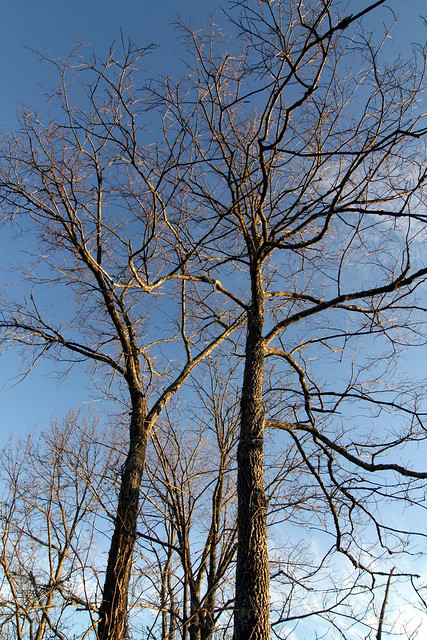
Facing winter's chill.
(*photo credit)
January 7, 2014 Compromise by Tweaking the Current Economy?
Peacemakers are tempted to say "compromise," and feel pressure to do what the public (except for some radicals and terrorists) wants us to do. It is like being tempted to sit down at a good home-cooked meal as one compromising consumer advocate (Ester Peterson from the Johnson Administration) once suggested to resolve nuclear policy differences among proponents and opponents. The trouble is that home cooking does not settle every dispute, especially when one side is in the ascendancy and the other a mere prophetic voice. It takes more than the conviviality of a meal.
We are immersed in a global capitalistic system and so some compromising and pragmatic voices try to defend the system even while admitting faults. These nod at the J.P. Morgan $13 billion federal fines for deceptive practices -- and legal settlements are by no means over when even massive payments are still "tweaks." So are tolerating tax havens estimated at $30 trillion and silently accepting the rising disparity of wealth in this and other countries. Changes must come, even when we are not ideologically inclined to say what they will be. And this is why this is not strictly combat between two ideologies, but an attack on a massive global ideology of capitalism. Naysayers demand existing alternatives while such have little room to exist and function.
The problem is that this current global system cannot be successfully tweaked -- and here neo-liberals do not give good service by their short-term solutions; they do not give an adequate response to concerned citizens about the inherent unsustainability of the current political/economics/social system. This system could have alternatives but the conversation is muted. In truth, it is highly tempting to say some possibility of compromise could be achieved if finances were regulated on a global scale, military spending brought into reason, and a totally renewable energy economy established in the shortest time -- along with fair taxes on all. However, these tempting elements exceed mere tweaking; they demand fundamental change, and that is "revolution."
Problems within this unsustainable economy are acknowledged: workers with little say on their livelihood; accruing wealth in the hands of a few; and failure to redistribute wealth through fair taxes. The greatest problem is the status quo seekers with power at their fingertips. Allowing injustice to continue is like asking a slave driver to compromise and reduce beatings to half the number: a mere license to continue injustice under the guise of "compromise." The will to change means overcoming the addictions of our consumer culture -- cheap bread and circuses for the multitudes. Treating injustice as a potential compromising situation is kicking the proverbial "can down the road" and enlisting the poor to do so through the promise of future wealth. Tweakers beware! A just society must be built on firm grounds.
Prayer: Lord, deliver us from the temptation to compromise in a situation allowing for continued global injustice.
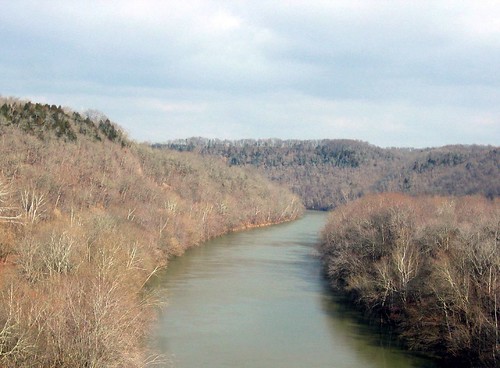
Hills of Appalachia along the Rockcastle River, Kentucky.
(*photo credit)
January 8, 2014 Will All Mountains Bounce Back?
Mountains can be denuded of forest cover and yet have been known to rebound. Our hills here in Estill County Kentucky were once denuded to make charcoal for an early nineteenth century iron industry. However, the hills have recovered with forested vegetation. Mountains have endured earthquakes and fires, ice ages and severe floods, and yet continue to heal to some degree. However, the wanton greed of recent generations has caused massive terrain changes and mountaintop removal. Denuded mountains can be healed; leveled mountains cannot. Mountains can be ruined. We observe the reclothing of denuded land; when leveled and severely cratered, scars remain like landscape near Verdun in France.
When driving through our countryside we note some minor scars of previous road clearings and developments starting to heal over and that old building sites revert back to forested areas. I recall near Livingston a small saw mill of the late 1970s, which has now almost completely disappeared, covered by small trees and bushes. Virginia creeper returns as do blackberry canes and black locust shoots and then the tulip poplar, black locust, pine and early forms of tree cover. The mountains again take on greenery though often that demands much time, for healing such milder wounds is still a long, slow process.
While mountain healing can sometimes occur, it is far more difficult when terrain itself has been profoundly altered. In modern times we have replaced axe, oxen, pick, and shovel with highly mechanized means of extracting coal and wood resources, namely, heavy trucks, backhoes, and massive earth-moving equipment. These modern innovations compact soil, tear down entire mountains, and destroy forest cover so needed to offer a sponge-like mat in the event of heavy rains. This brings us back to the title's question mark. Resilience is not a miraculous happening; it does require nature to work unhindered over time. However, human beings can frustrate natural processes through deliberate greed and poor management. Yes, lush and fertile plains in Africa and the Middle East have been turned into desert through human neglect and mismanagement. Could that happen to our Appalachian Mountains?
We are called to hasten the day of the coming of the New Heaven and the New Earth. Hastening includes allowing natural processes to work and to augment their healing process. We can renew, but only to some extent for we are limited beings. The best we can do is stop the massive earthmoving endeavors and adopt a policy of leaving fossil fuels where they are, and turn to renewable energy sources, thus keeping mountains intact and able to be resilient. It takes brave souls to say that in these parts. We mountain dwellers are shaped by our landscape and yet we experience sickness and mortality, but does this mean infecting our mountains as well? If we wound our land, we harm our communities of people.
Prayer: Lord, teach us to respect our mountains, to halt greed, and to heal what is harmed and calls out for assistance.
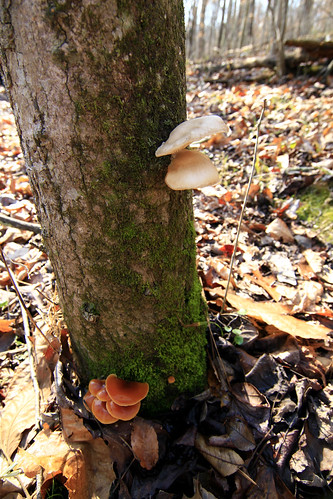
Explore fungi in winter's forest.
(*photo credit)
January 9, 2014 Support Hospice Programs
Every day is a good one to admire and support the hospice workers, who through care and kindness make the ending of life of the dying a far more loving and dignified experience. These good workers, often volunteers or working at moderate wages, give both compassion to the dying and courage to loved ones who become exhausted and stressed from grieving and expectation of death. The dying crave a special accompaniment to the moment of departure at this most important moment in life, the "hour of our death" as recited in the Hail Mary. People say they want a more familiar and friendly place to die, though at times the best assistance is through institutional care facilities when the home setting and caregivers are incapable of doing the best right at the end. Whatever the ultimate circumstance, the presence of care-giving people is highly appreciated by all concerned, for mercy is called for at the end -- and hospice workers often fill this need.
Loving primary caregivers prefer to carry through to the moment of dying, but find the task can be overwhelming. Here hospice workers come and give that service in the home in the best manner possible -- for final decisions rest with close relatives and those so empowered as primary decision maker. Hospice work includes controlling pain, doing the bathing, and assisting with medical needs. Presence counts much. In this final hospice period many types of medicine unrelated to pain relief are usually withdrawn and the dying person is relieved of unnecessary tubes and apparatus that simply stand in the way of a high quality end of life. Loved ones need to be convinced of the inevitable and here the hospice workers have an important role.
Hospice care can be part of a normal professional health care facility, whether stand-alone hospice facilities or integrated with local hospitals. In one Milwaukee hospice program, some two-thirds of the patients are able to die in the familiar settings of their own homes, while those who returned to a hospital setting ordinarily do so for a few days or, at most, a few weeks. Some hospitals now have hospice units which are quite well provided with staff and equipment; they are often decorated in a home-like, non-institutional fashion. Hospice can work well at institutions and in conjunction with family wishes.
The process of dying is natural, though sometimes family members of the dying person remain in a state of denial; they do not realize that their own acceptance is part of the dying process, namely the courage to "allow" the person to depart from their company. Thus, the close ones often have to give permission for the dying person to pass on to the Lord -- and here hospice workers can play a vital background part. Systems shut down and acceptance is critical and needs support. Review: National Hospice and Palliative Care Organization <www.nhpco.org>; and Hospice Foundation of America <www.hospicefoundation.org>
Prayer: Lord, bless the work of those who assist the dying.
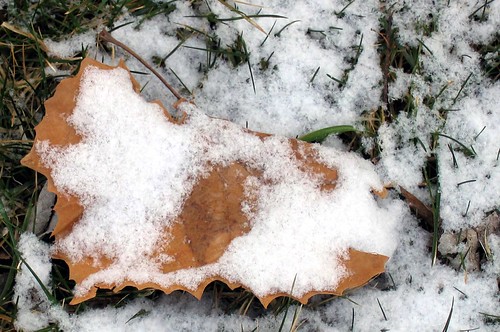
Leaf od the American sycamore, platanus occidentalis.
(*photo credit)
January 10, 2014 Champion Snow Benefits
Snowfalls come often when we least want them, but beyond emergency preparation (January 3) we can actually welcome them, for they have overlooked benefits worth mentioning.
Snow is healing. Let's see the gentle side of a snowfall and cover. Snow is not a threat unless we are unprepared for it. Once prepared, we find this snow blankets Earth's wounds and scars. Snow is a natural care giver of wounded land. Snow is the temporary but spotless garment of the naked landscape, and this gives both us inhabitants and land itself a sense of comfort and new-found dignity. We are tempted to hope snow will stay forever and let land rest and convalesce in all her beauty. Furthermore, snow comforts us and helps to soothe our nerves. Hear the sound of tinkling, falling snowflakes; other noises are muffled and we focus on nature's concert, the creator's work with musical instruments.
Snow is something necessary. When we suffer from droughts we appreciate the moisture added by snow to our hills and forests. Snow offers an effective protection against winter forest fires and furnishes us with needed ground moisture for the coming growing season. Snow is a resourceful blessing that adds to the gurgling brook and the flow of the rivers and streams, especially in our mountainous regions. Even in areas such as last fall's four-foot snowfall in South Dakota, we know that inconveniences are overcome by the extra abundance of moisture in the upcoming year.
Snow is inviting. Snow offers the youthful, whether young or old, a time to romp and play. Once I was amused while two grown students from tropical lands (who had never experienced snow close up before), ran out and rolled in snow, laughing and carrying on like four-year olds. Snow triggers the youth in all of us if at least for a moment; we older folks know that after the initial exuberance, snow chills us and can wet our clothes if allowed to melt. For a short while, snow is more than a blessing; it is a dash of heaven on Earth. Some of our best memories of the past include bobsled rides down the snow-covered hills of Kentucky. Climbs back up required exertion, but the rides down were like pure abandonment from the gravity of concern.
Snow is overwhelming. Is it true that God designs the pattern of each snowflake in a different way? Who can say that with any sense of definitiveness? Is that a major question when we get past the heavenly gates? Snowflake total uniqueness cannot be proved or disproved. Let's say the tiny fraction of all snow flakes recorded has never included a match and no one has catalogued all of these few recorded patterns. All snowflakes may be different, and that possible uniqueness magnifies the mystery in a snowfall. We observers are all created unique as well.
Prayer: Thank you Lord, for snowfalls and cover, for the beauty of the landscape and the soothing effect snow has upon us.
Thanks for the sights and sounds of snow at least for awhile.
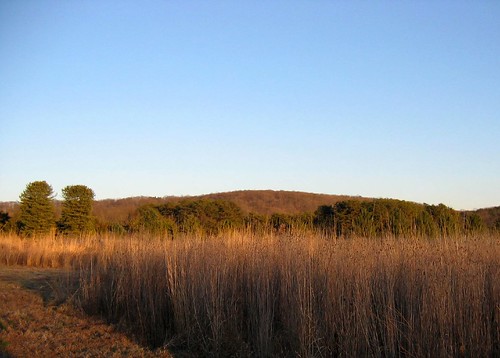
Prairie restoration project. Bernheim Arboretum and Research Forest.
(*photo credit)
January 11, 2014 Promote Healing of Our Wounded Earth
Once a year we reaffirm out commitment to healing our Earth that has been so damaged by human greed. Our planet suffers from lack of respect, a virtue in sore need in a world looking for what is "deserving" of human comfort. If we are seeking to heal the Earth, we must be willing to regain self-respect as well as respect for life and our neighbors, whether human or other. This goes beyond neglect of proper titles, which often cultivates an informality that can devolve into disrespect. Perhaps an informal attitude is comfortable, but at other times we see the effects of informality on lives of disorganized people who need more established relationships to straighten their lives.
Some of the informally inclined regard Earth as a product that they can seize and call their own by some law of property "rights" that knows few limits. This informality about acquiring land resources is documented by Richard Kluger's book Seizing Destiny: How America Grew from Sea to Shining Sea. A disrespect for the Native American inhabitants becomes painfully apparent with 400 treaties, none of which were strictly honored. It is the informality of the powerfully ascendant culture. This wrongdoing has had drastic effects on our land commons, wildlife, and all areas of community. If we are so bullied to allow others to tramp on what is ours (not mine), then we are partners in eco-crimes that perpetuate themselves into a culture of consumption. For three hundred years the practice was to use up land and move on.
Primitive peoples may be far more "developed" when it comes to respecting creation. Native Americans only harvest every fourth ginseng plant; they ask forgiveness and show thanks for the animal killed to provide food; they consider it necessary to walk gently on the fragile Earth; they do not gather more than what is needed for the coming season -- and share what is gathered. In fact, in areas of limited land our forebears showed respect for God's creation and that legacy we need to rediscover and apply to our use of resources. We cultivate a return to respect through religious reverence -- bowing before the Holy Name, silence in the presence of the Lord, prayer before meals, proper gesture, and sincerity of the handshake of peace. Reverence includes respect for what is due to all and to express this publicly.
Without a profound respect, we are imperfect caregivers when healing is a prime activity for all concerned citizens. Wasting electricity or water is a form of disrespect, as is trashing what ought to be recycled and that includes land. Lack of encouragement for those seeking to live simply is disrespect. None of us want informal caregivers, nor should we expect informality in healing our wounded Earth. Formal attitudes of respect call out to be accentuated. The growth in renewed sensitivity takes time and concerted practice. How can we become more ecological if we do not respect life in all its forms and resources meant for all?
Prayer: Lord, help us to grow in respect for all your gifts.
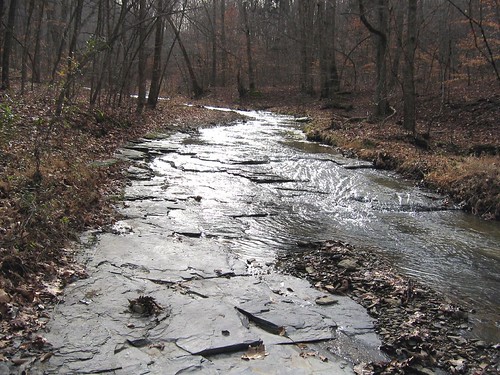
New Albany Shale creekbed, Boyle Co., KY.
(*photo credit)
January 12, 2014 Baptism Activates Us to Be Liberators
I, the Lord, have called you to serve the cause of right;
I have taken you by the hand and formed you;
I have appointed you as covenant of the people
and light of the nations,
to open the eyes of the blind,
to free captives from prison,
and those who live in darkness from the dungeon.
(Isaiah 42: 6-7)
These mighty words from the Prophet Isaiah are meant to move us in the presence of the Messiah. Yes, Christ came and was baptized by John as a foretaste of what we are to do and become when brought into the family of the Lord. Why shift focus so quickly from him to us? Why not focus instead on what Christ did when he came? If Baptism is the start of his ministry, isn't time better spent trying to imitate him than attending to our service?
These questions do not tell the entire story. Study and learning about Christ have a passive sense of rest in preparation for action -- but not doing it. We imitate by doing, and in reflecting on our deficiencies we try again openly and humbly. Of course we focus on Jesus Christ, but that focus is not on a past event alone (three years of his public ministry). Christ came; Christ comes now; Christ will come. We make Christ present through serving with our feet, hands, heart, and voices. We carry on as commissioned, as active members of the Body of Christ through the Baptism we have received. This sacrament of initiation purifies us for the task ahead; it invites us into the divine family; it sets us apart as Christians to bring merciful healing to a troubled world; and it bonds us to Church with like-minded individuals.
The cynic may ask, "Did Christ liberate any prisoners?" Our answer is that the mission foretold by Isaiah initiated a process that has taken at least two thousand years and will continue to the Second Coming. Christ initiated us to be of service and to represent him in the total mission. We enter into the Isaiah prophesy itself. When judges demand that California reduces its prison population by tens of thousands they are helping to fulfill the words of liberation of prisoners. We in America, with the highest prison population in the world, are democratic people who can influence change in the system that puts so many behind bars. We are called to be wholehearted change agents -- and in doing so we fulfill the prophecy directed to Christ.
Baptism is a cleansing, power, mandate, becoming, future, and union through divine power. We are God's beloved not in the infinite love of Father and Son, but still as immersed in the ocean of divine love. With this love we are called to do wonders, and that includes liberating prisoners and being a light in darkness. The mission before us has immense possibilities, if we but listen.
Prayer: Lord, open our ears to hear Isaiah and to see that
these words apply to us and our mission today.
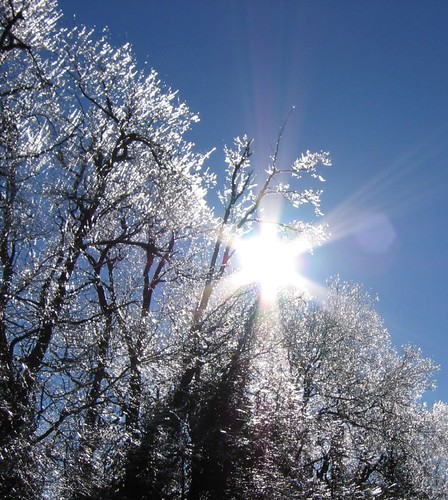
Imagine nature's sounds of creaking branches with ice.
(*photo credit)
January 13, 2014 Music Enhances Healing at All Levels
We need the healing provided by natural music in the form of pounding surf, rain drops on the window, chirping birds, squeaking ground squirrels, and rustling leaves. Certainly all these have a way of soothing our nerves. Still, something more fits into the field of "natural music" that we often overlook, namely the healing effects of certain forms of music by human composers who enter into the cooperative act of creation in some fashion. On this birthday of Stephen Foster, who captivated the hearts of many (especially older generations), we can truly celebrate healing forms of music.
* Liturgical music is heavenly, and composers have that mysterious manner of capturing us, allowing angels to descend and listeners to briefly ascend to the heavenly court. Monastic music gives church gatherings a special flavor that allows us to find the Lord's presence. Our brokenness seems to fade when we experience God's mercy in chant and church music. Homilies and sermons attend to the mind, but liturgical music touches the heart.
* Secular music can heal the distracted soul in times of sickness. Such music can transport us out of our misery to anticipate better times ahead. Music elevates us above our ordinary lives and gives us courage and hope that improvement is possible. Music extends beyond the life of the composer and offers a taste of eternity. We would not be totally human without music.
* Youthful and companion music and songs around a camp fire bring a sense of solidarity so needed in our fragmented society. The proper musical instruments and the ability of all to sing along gives a sense of cohesion that we all long for in so many ways. Thus, knowing the oldies is as important as listening to entirely new forms of music.
* Making music brings a sublime sense of enjoyment in the faces of the privilege music makers. Gathering to perform or to sing along with music makers allows us to be moved in the depths of our hearts. A mother's lullaby, someone singing in the shower, or those who sing or whistle while they walk or work all have a sense of primitive creativity, even when general audiences may not appreciate their efforts.
* Our family's music was central to special events and often the focus was with 19th-century composer Stephen Foster's haunting melody "My Ole Kentucky Home," a sentimental lament of being away from home and the times that would never return. We sang this at my mother's funeral while taking her to burial. Our family loved to sing together renditions of my mom's favorite, "Ole Black Joe." Celebrations, both times of joy and sadness, are found in timeless folk songs that all feel free to sing together.
Prayer: Lord, allow us to anticipate the heavenly court's music which exceeds all, for its harmony is part of the universe's
natural music to which we are often imperfect listeners.

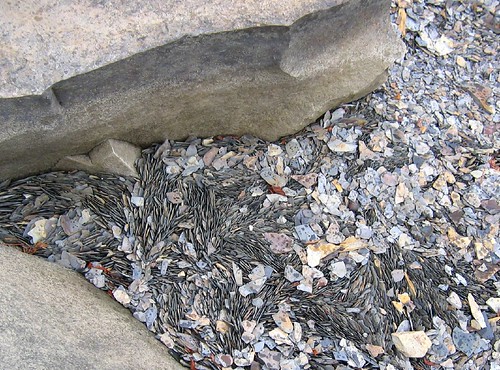
Patterns in shale. Rowan Co., KY.
(*photo credit)
January 14, 2014 Stuck in Tar Sands and Shale Rock
Canada has a reported 180 billion barrels of proven oil reserves, of which 95% are in oil sands, but some of which would be difficult to remove and process. The more available reserves have major problems including liberating oil from sand or rock: water required is hard to decontaminate, landscape does not heal easily, heavy oil requires effort to transport and is fraught with risks of dangerous spills and refining problems. Current opposition to the XL Pipeline across mid-America is justified.
The world is using more fuel each year and the rise in carbon dioxide levels make inevitable climate change a reality with frightening consequences. While renewable and essentially carbon- free alternatives exist, the big oil companies with enormous influence on governmental policies make one last desperate attempt to include tar sands in an acceptable energy mix. The jury is out as to whether they will succeed. Fracking for both natural gas and petroleum changes the equation; cheaper natural gas delays growth of renewable energy -- and there are environmental problems also.
In the early 1980s, besides tar sands, vast oil shale fields were touted as fuel sources of the future. According to estimates trillions of barrels of hydrocarbons were trapped in both eastern and western North American oil shale fields. The first experimental plant in western Colorado was closed down in 1982 due to operating costs and water shortages. At that time considerable attention was given to the Devonian Shale outcropping in Kentucky, Indiana, Ohio, and Tennessee. These eastern fields were estimated to contain 400 billion to 2.6 trillion barrels of oil. At public hearings and conferences we asked pertinent questions as to whether processing shale rock could really give net energy returns.
Once liberated, both tar sands and shale rock contain petroleum products, but the effort to remove these when we should be moving to a carbon-free energy economy simply distract from the task at hand. The heart of the matter is not cheap natural gas from fracking operations or the pie-in-the-sky tar sands or shale bearing fuels turned petroleum products. The heart is the will power to move to an energy mix that has the lowest environmental impact on our environment.
Air and water needs to remain uncontaminated; electricity needs to continue uninterrupted through combinations of solar, wind, hydro, and geothermal -- and transitional natural gas. Yes, leave tar sands and shale oil in place, for water needed for extraction must supply food-growing needs. Clean up the environment and don't add processes that will dirty it. Tar-sand-fracked petroleum is the epitome of our dysfunctional carbon-based energy economy that does not yield net benefits due to high environmental costs. Common sense must undo unsustainable practices championed by profit-seeking Big Oil.
Prayer: Lord, help us to come to our senses in energy matters.
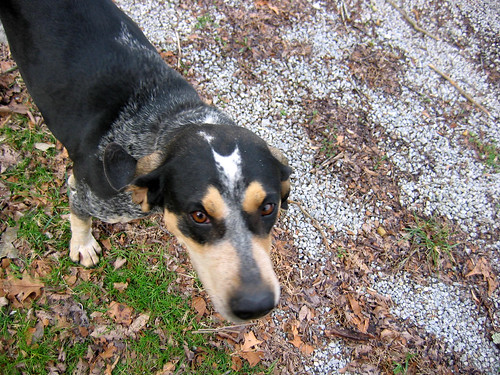
Eastern Kentucky farm hound, loyal friend.
(*photo credit)
January 15, 2014 Discrimination: "Hillbilly" as Disparaging
On Martin Luther King's Birthday, we pause and review our own journey to remove any form of racial or other discrimination from our world view. We are one family and do not like to disparage any of our brothers and sisters through remarks, bad jokes, acts of segregation, or regarding others as outside our ranks. Do we harbor hidden biases and ought this be made public?
In the 1940s, I grew up in segregated America near the town (Washington Kentucky) where Harriet Beecher Stowe saw a slave sold, inspiring Uncle Tom's Cabin in 1851 -- and arousing the conscience of a nation. In my early school days, it made me angry to see our lily white school bus pass up our wonderful black neighbors and forcing them to take a small vehicle to a one-room "colored" school. I remember we had family discussions on segregation and decided that black workers who ate the same food could share our dinner table, a real break with local tradition. We were taught to respect our elders of any race because we found so many black people amid their sufferings to be truly wise, compassionate, and forgiving. Perhaps that was and is reverse stereotyping -- but so be it.
Living in the Appalachian Region allows me to recall racially segregated days and find that other remnants remain of equal par, but here dealing with mostly white folks. We would never use the "N" word heard frequently in my youth, but we have another that is almost equally disparaging, and that is "Hillbilly." To make this an unspeakable term will take much time and effort. Some may protest that they love to be called this "H" word and this means that people do not YET take offence in the use of the term. Some others within Appalachia complain that I am a killjoy for even bringing this subject up. However, the prejudice associated with the "N" word and this "H" word is very much related.
Racial discrimination still haunts us all in often hidden ways. Hearing the "H" word and seeing it on artifacts and in advertisements brings back memories of racial segregation. "Oh, they don't mind being considered different." In fact, on closer examination, we find Appalachian culture is looked down upon; the "H" term contains excess baggage that needs to be dissected. Discrimination does not disappear unless publicly exposed for what it is. Some within this region kid themselves with this "H" term and unfortunately some restaurants and programs use this in their title and think it is cute. Pressure has not developed to change it, but let this be a start.
I beg pardon for all of my race who looked down upon, enslaved, segregated, lynched, and disparaged members of another race. What is so comforting is that many people are quick to forgive and allow us to move forward in this imperfect world of different races, creeds, colors, and cultures. Let's go forward.
Prayer: Lord, teach us to treat others with sensitivity.
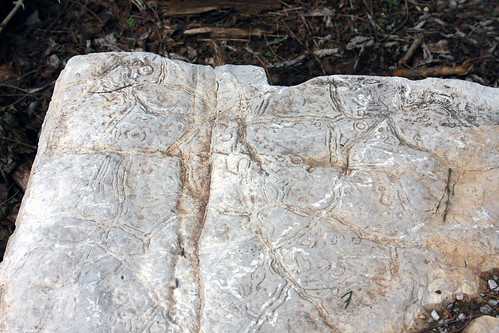
Kentucky River Marble, dolomitic limestone from the Oregon formation, with fossils.
(*photo credit)
January 16, 2014 Visions of Youth and Dreams of the Elderly
Your sons and daughters shall prophesy, your old men shall dream dreams, and your young men see visions. (Joel 2:28)
Are dreams to be quickly forgotten? What if they are so earth-shattering that they could help fashion a new world order? Joel speaks of a new age, when the Spirit will direct the lives of those coming to the Day of the Lord. Ultimately, listing dreams that are possible templates for an ideal social order is not an exercise in futility, but the expressed wisdom of elders before their final hours -- a final hopeful fling to help hasten the Day of the Lord. However, throughout history people from Sts. Augustine to Thomas More and from Ben Franklin to Franklin Roosevelt and Martin Luther King, Jr. dreamed of lofty goals that were possible. Jesus certainly encourages this.
Men still laugh at Jesus the dreamer, or wistfully sigh for ideals beyond their grasp. Norman Thomas as quoted in Conscience, by Louisa Thomas, Penguin books, 2012.
What brings on such dreams? Consider this suggestion: we seek a legacy, a mark left in a changing world as we make our departure. Some express this as dreams that their offspring will succeed, their businesses prosper, and that The American Dream painted in materialistic shades might endure. For those of us parentless and yet with the urge for a surviving legacy, we are drawn to meaningful dreams. Those of us who believe in an after life could learn from St. Theresa, the Little Flower, a doctor of the Church, who asked God that her good works might flourish after her early death from tuberculosis. And her prayers were answered with the most successful autobiography ever written, along with a multitude of miracles to punctuate her favor with the lord.
Can we follow Theresa's example and pray that our good works may continue beyond our mortal life span to sow seeds of success? Our dreams reach for a better life for those who follow us. Would that these hopeful works benefit all ages, whether with our names attached or anonymous. Certainly, these elderly dreams will only have enduring benefit through heavenly grace. It is not a false idol of this materialistic world, but rather the wish that God's kingdom comes soon. May what appears as utterly necessary for the world actually occur, even if beyond our sojourn on this Earth. One prayer for the newly ordained priestly ceremony is that the works of the person prosper -- but why stop at death? May the works we begin have continuance for the betterment of our world. Was Theresa's request selfish or utterly selfless since they are God's works? By her example we dream as elders for eternal life and continued life of our works.
Prayer: Lord, let our dreams come true, but in your good time; let them be a testimony to a maturing spiritual life and a model for others to follow. In these dreams coming to reality may your kingdom come.
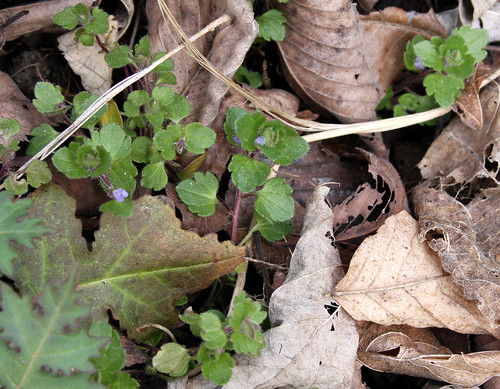
Hardy purple dead-nettle, Lamium purpureum, blooming in January warm snap.
(*photo credit)
January 17, 2014 Should We Strive to Impose Democracy?
Benjamin Franklin's Birthday is a perfect day to reflect upon democracy and how much the philosophy of this founding father of our Republic might have to say about the growth of the democratic spirit. Perhaps Franklin might say that our primary concern at this moment of dysfunctional government is the flowering and modeling of that democracy here at home and abroad. Freedom is the heart's desire but one can hardly impose free choice on another, no matter how good we think the future result should be. We are tempted to "impose" because so much of what is troublesome today in our social order is imposed on us for better or worse. Threats to our freedom and democracy are being imposed. Thus an urgency arises of countering force with some sort of protecting force.
Yes, freedom is not the license to do entirely what one pleases. Democracies require some regulation for the sake of protection of individual and community freedoms. To impose on others what we still have as insecure in our own land is unhealthy hubris, for it blinds us to our problems close at hand. Maybe the founding fathers must be referenced again, for they chose to change a government that called itself a "democratic republic" in order to make a more perfect union. That perfect union is still a work in progress, and it does not follow that we Americans have the arrogant task of being self--righteous "policeman of the world."
Democracy as a system of governance springs from the will of a people who express their interior desire to be free citizens, or simply self-sustaining individuals. Democracy is a fragile structure and responsibility is needed for its endurance. To make democracy work in this country we must exercise proper civic and political will to work for betterment. Naysayers may glory in a paralysis of our American government, which could devolve easily into an escape through autocratic or military rule as one way out. Recall that Hitler won a democratic election in 1933. Democracy can be destroyed from within just as easily as imposing democracy from without. The issue is not to impose democracy on others but to ensure democracy through a renewing revolutionary spirit at home that attacks the ills we have within.
History is our best teacher and can enlighten us about proper democratic process. Unfortunately, the proponents of the current Afghanistan military withdrawal policy may wish to impose a democratic process -- and that may be an unrealistic dream. Some policies can hasten democratic process, but inherent antagonism between warring factions can retard that process -- and Middle East factions have a negative power to spoil democratic process and hasten from spring to a summer of discontent. Iraq has missed an opportunity to federate into Kurd, Sunni, and Shiite spheres. With the Ottoman Empire dismemberment at the end of the First World War, western countries sought to impose democratic nationhood or artificial states called Syria and Iraq. Has it worked?
Prayer: Lord, help us see the fragile nature of our democracy.
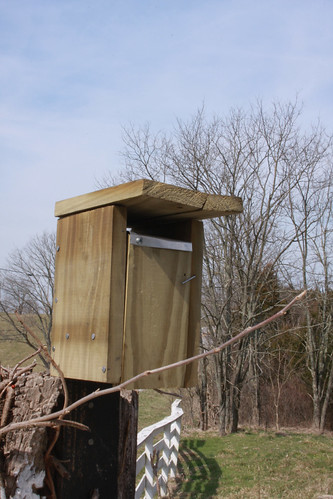
The Kentucky Bluebird Box designed by Wayne H. Davis.
See here for plans.
(*photo credit)
January 18, 2014 The Global Immigration Phenomenon Confronts Us
Contemporary immigration represents the largest movement of people in human history. At last count the total number of immigrants was 232 million or 3.2% of the world's population, while it was only 170 million in 2000 and 154 million in 1990. Currently Mexico is the largest source of immigrants, but Africa as a continent far exceeds this one nation -- and exiting numbers of Africans are dramatically rising. They come through at high transport costs in unsafe leaky boats; they brave rivers and deserts. They come with few belongings and high hopes that work opportunities await them in the host country. Upon surviving a journey more troubles occur, for dreams are not reality -- and they are foreigners with few contacts, language skills, and places of residence. Unfortunately, few in the host lands greet immigrants.
Matters will worsen. Several causes may exacerbate this immigration phenomenon: higher unemployment rates in nations with growing populations; lower birth rates in some traditional industrial nations; loss of low-skill industrial jobs due to automation; vulnerability to human abuse; and inevitable climate change. People are desperate for jobs and few are available in their homelands. Some 80 million Egyptians including millions of youthful unemployed with college degrees, vie for limited openings; many head for oil-producing lands like the Emirates and Libya with now majority immigrant populations. Germany and other low birth-rate nations actively seek skilled immigrants but find themselves burdened by the unskilled. Physical abuse of the arrivals is a matter of deep concern, especially for vulnerable young women.
The September issue of National Geographic has a very illustrative article on the "Rising Seas;" what is coming in a few decades is a tidal wave when Bangladesh is totally submerged along with Pacific and Indian Ocean island nations, and major cities in China, South Asian, Europe, and America. Maps of flooded lands and cities are sobering, and results catastrophic.
We are all immigrant offspring. Yes, all of us are strangers and guests in this world, even the "First People" or Native Americans. We may say longer-staying residents are more entitled to benefits, but are they? Since we all share some immigrant status, we need to treat those who come more recently with ever deeper compassion and respect. Often, these share our own desires.
Family unity is at the heart of immigrants' hopes. Today we mark the beginning of the Week of Unitive Octave, when we pray for the union of all Christians and the People of God. Few areas of potential unity require more attention at this time than providing decent livelihood for all people. Many immigrants go to great expense and risk to find work. We must help establish working conditions at home where people can raise families in relative peace and security -- and help those who move elsewhere.
Prayer: Lord, inspire us to ensure proper livelihood for all.
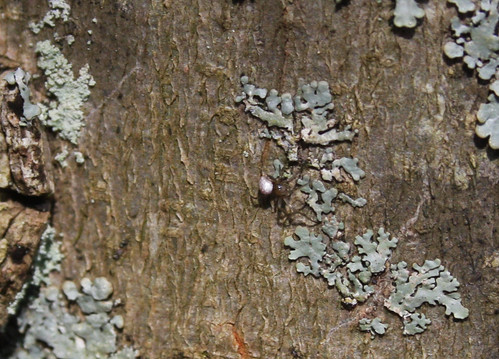
Exploring edible lichens in winter.
(*photo credit)
January 19, 2014 John the Baptist: The Art of Stepping Back
A man is coming after me who ranks before me because he existed before me. (John 1:30)
In today's reading there is a simplicity in John's words which really shows the greatness of this prophet. He is to prepare the way for Christ and this is precisely what he does. At times, John's own disciples regard him with a deference that he finds uncomfortable, for it is not he but the one he prepares for who is "great." Thus, in deep honesty John is able to turn the faces of all to the one who is the subject of his ministry, Jesus.
Imitation is possible for us. There are many things in John's life that we cannot or will not be able or willing to imitate: dancing in the womb, going into the desert to live, eating a diet of wild honey and locusts, baptizing great numbers, facing the king head on, speaking the truth to a hostile establishment wherein he literally loses his head -- and not fully knowing Jesus in his lifetime. However, John's greatest achievement is to step back and let the Lord's words and service become paramount. This we can do and do well if we try. We can know the Lord even better than John and still prepare the way of the Lord for others to follow.
We can step back for others. As we move through life there are many things we find closed to achievements, and we accept our limitations for what they are. However, we can do simple things in imitation of other humble people. One of these is to step back and let others do what they are best at doing. This could make the world a better place. By stepping back we usher in God's presence to others who do not recognize that God is here with them. We are not top dog; we are not initiators of powerful deeds. God is. Stepping back for God to show greater glory to the human race is a deeper and more penetrating spirituality that is answering our call to diminish while the divine glory shines forth. God works through us, if we are as transparent as Immaculate Mary was at the birth of Christ. Her purity gave a transparency that we can strive to imitate -- because we too are blessed by God in our midst.
We can know Christ. Jesus affirms that John did not know in the ways that we can. Certainly John strived to know him and still stepped back in trust that a light was coming but not yet shining for him to perceive. And Jesus said this was a mark of John's greatness. On our journey of faith we have more knowing to do, but we have sacramental tools to assist us. We want to know the Messiah as well for he gives us the mission (as mentioned last week in the Baptism discussion) to spread the Good News to others. How can we better imitate him in this service required of us as recipients of the definitive Good News, something that John the Baptist was not privileged to possess in his life because of his circumstantial distance from Jesus?
Prayer: Lord give us the grace to step back to allow your grace to work through us; encourage us to spread the Good News.

Peering into the woods at evening.
(*photo credit)
January 20, 2014 Knowing Someone who Remembered the Civil War
Memory is a precious divine gift and worth being thankful for as long as we are mindful. When we age, our recent memories are harder to retain (what I ate yesterday); however, some memories from older times are still vivid. Our neighbor across the road in the big 19th century brick house was Ole Joe Davis (see Website story). He was ancient -- ninety when I was ten. He too was blessed with good memory of his youth; he would talk to whoever took the time to listen. When he in the 1860s was my age (in the 1940s), the Civil War or "War between the States" was raging, and he could tell specific tales about life in those turbulent years.
Mr. Davis' gait was extremely slow, and it took a half hour for him to come to our house. He wore one of those classic straight brimmed straw hats from the 1920s. When Mama was alerted that he was coming for a visit, she would dispatch me to sit and listen to him -- for he called her "Lizzy," a supposed term of endearment (his mother's name), but Mama did not like it, and she did not want distraction from her busy house/garden work. That was a pleasant assignment for me and resulted in my treasuring the art of storytelling in which many Kentuckians excel. Without Mr. Davis' natural storytelling finesse much of his legacy would be lost -- for none of his many children apparently had offspring.
Mr. Davis tailored his stories to those who could and would listen. He vividly remembered both the start and the finish of that bloody civil strife of over 150 years ago. His father was apparently called up to the Kentucky Home Guard at a critical time when the Commonwealth attempted to remain neutral as a border state in 1861. Yes, his family did own slaves to the best I could gather and the decennial censuses indicated. However, the Commonwealth was truly divided over whether that "Peculiar Institution" would continue, since many slaves could easily escape across the Ohio River to freedom. Mr. Davis experienced the local fright when General John Hunt Morgan's raiders came into this region hunting horses, not knowing where his father was when soldiering, the tearing apart of a family when relatives joined the other side, and the need to keep cash in both American and Confederate currency. And decades later he provided for a shell-shocked son, a veteran of the First World War, who never fully recovered.
In 1943, we siblings lost both our maternal grandpa who lived two miles away and our beloved neighbor "Ole Joe Davis." They both left indelible marks on us. Years later, when I returned to record the Davis family graves and original homeplace near the Lewis County border, I experienced the fragility of human history. Only by happenstance could I discover the abandoned cemetery of his Revolutionary War forebears. Mr. and Mrs. Davis had nine children but apparently no grandchildren, and so a living family tradition could have been lost. I tried to be a good listening and transmitting neighbor of one who remembered the Civil War.
Prayer: Lord, help us transmit our best memories to others.

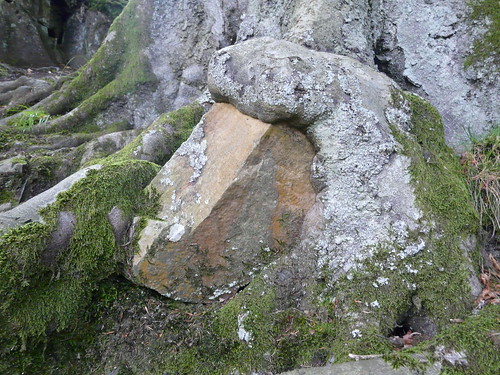
Tree embracing parent rock.
(*photo by Greg Wake, Creative Commons)
January 21, 2014 Hugs Are for Everyone
Today is National Hug Day and in these times of heightened disharmony hugging could have global implications. Would that Arabs hug Israelis, Japanese the Chinese, and Northern Irish Catholics their Protestant neighbors. The universal gesture is worth more than a million words. A planetary hug fest would do much for overcoming our antagonisms.
Last October, a Kentucky Monthly article entitled "Hope, Healing and Horses" detailed how much sick children gain relief from dealing with gentle horses at Lexington's Angel Heart Farm. One of the photos shows a little child hugging the neck of a Welsh pony "Katarina," demonstrating the power of equine therapy. In truth, dogs do the same at hospitals but therapy horses have their place. However, we can go further and say humans hugging humans has therapeutic value as well: at the death of a loved one, the return after a long absence, the report of grave illness, the child or spouse who craves more attention, the thanks to someone who gives a gift or a kind word, the thank you for a little gesture of good will, the reward for doing a good job, the return home from work or study, or just opportunity to share a sincere peace prayer.
We enjoy when someone sincerely extends a hug, for it communicates much more than words. Knowing that I am concerned about the environment someone asked if I am a tree hugger. Frankly I am for rather practical reasons of measuring the girth of a tree using body parts. By extending two arms fingertip-to-fingertip it is almost exactly one English yard (a little less than a meter); lifting one hand from the entire span cuts a half foot and lifting two hands gives five feet within an inch; by lifting hand and arm to elbow reduces a girth total of a foot and a half and twice over cuts the width to three feet. Without a measuring tape I can come within an inch or so of the girth of any tree -- and so my tree hugging has practical silvicultural results. As for hugging trees for their own sake I refrain. Horses, yes; friendly dogs or cats, yes; but wildlife requires some restraint. Hugging plants, well not so much, though I do not fault those who do.
Hugging may break the personal space of another lacking the culture of the embrace. Most people know just when to hug and when not to. The emotionally immature may break into that space and may invite the other to become more inclusive in the act. A young child learning to walk is a candidate for a hug as well. Winter is more the hugging season: some hug mufflers, others dolls, more the fireplace, and many bed covers, and most hug other people very much at this time of year as well. Hugging is a universal human expression worthy of promotion at least one day a year. Warmth and endearment exudes from one "hugee" to another and this is reciprocated. Maybe the act will become contagious.
Prayer: Lord, your embrace is so needed in the overly cold world in which we live. Prompt us to open our arms to hug and in doing so embrace our troubled planet and its inhabitants.

Remembering summer's zinnia garden.
(*photo credit)
January 22, 2014 January is Remote Garden Preparation Month
This time appears to be a respite before serious outdoor garden work for the upcoming growing season, but ought it be the time that our planning has some inspirational value for the confirmed gardener? Let's make this period prove that an early start is our best kept successful gardening secret.
* How about creative choice of varieties? Let's select a number of vegetables/herbs, say thirty, as the goal for the 2014 garden year. Review which veggies or herbs did not do well last year, and replace these with another of different variety. Maybe it is time to add a few perennials (herbs and vegetables) to lessen the work and number of annuals needed. Which wild plants (poke, sorrel, violets, dandelions, etc.) should be included in the varieties allowed in the garden?
Where will the seed be procured? Do we save our own or need another source? This is the season for opening and reviewing catalogs that have come in. Don't neglect to consider your own home supply of saved seeds or obtaining bulk seed at the local garden supply source.
* Should we consider total existing or new garden space? Decide how much ground will be tilled in the spring. Was the garden too small or too large? In case of a possible dry season, what is the existing water system for needed irrigation?
* Should we map where certain vegetables are to be placed? Deciding on the exact location of vegetables is too restrictive; it is better to have some flexibility to benefit from success of existing flourishing varieties and to provide space for interplanting. Flexibility in gardening has always proved better from the standpoint of creativity and specific seasonal conditions.
* How about keeping records or at least more complete records? It is nice to keep exact records of total yields but this does get cumbersome, especially when giving some produce away. Keep a good notebook in a handy place to do the recording in busy times.
* How about soil amendment? Now is the time to procure some wood ash for sprinkling on the garden to add needed minerals. Take care not to over-apply ashes. Obtain extra organic materials as well. Consider where to obtain additional materials and how much investment is needed during the 2014 growing season.
* How do we include the community? Gardening is something personal, but something for the community as well. What is a way to get others involved in growing their own produce this year? There is a lot of open yard space that could become a garden plot. How do we encourage and challenge others to take on the practice?
Prayer: Lord, allow us to include garden planning in our prayer for January.
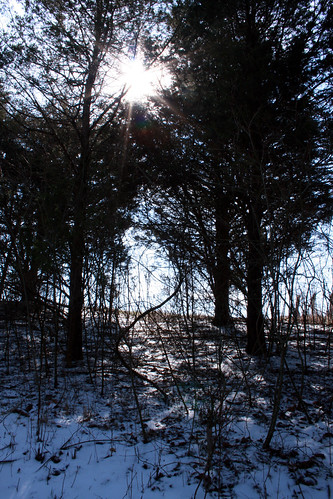
Cedar grove filters weak winter sun.
(*photo credit)
January 23, 2014 Spreading Word through Digital Media
Yes, this is Handwriting Day and mine is getting more illegible by the year. A shaky hand doesn't help for I can hardly read my own handwriting. Let's observe this day in a broader context, and reflect on turning handwritten notes into reports and books. Some early scribes did this through the printing press, later typewriters, and then in recent time through computers and hand-held electronic devices. Reediting through modern rapid word-processing methods has been a way of speeding the word to others via public means. Very few publishers (whose ranks are thinning) are willing to publish hand-written manuscripts today. Perhaps poor penmanship is the culprit -- and the added effort.
Published thoughts. We sometimes have a theme that we feel is worth developing. We prefer to put this unpolished gem in more coherent fashion and thus write, and revise, and revise again. The deluge of written information makes it a growing challenge to gain limited attention from others even with a fortunate search engine and a skillful web manager. People today skim quickly, discard emails (though in theory the record is not lost), and are attracted by enticing material. Books in paper seem to have greater endurance and, if one can attract another to spend time, the reflection has an audience.
Digital and paper. Warren Brunner's photos with my texts for each month using all five senses has just been published in paperback form. Appalachian Sensations: A Journey through the Seasons is now available through Amazon.com for a moderate price. The paper gives permanence to those wanting to reference texts and to activate the senses as well. These photos have been well matched by Pat Brunner and designed in a pleasing format by their daughter Gwen (and grandchildren as well). Once published, availability is a foremost characteristic of the digital age, and specialty writers have a better chance with these modern publicity opportunities. They do not have to search for the perfect publisher to test the potential market.
Digital publishing. Having said this about publishing paper editions, still much is worthwhile through electronic media -- or we would have abandoned "Daily reflections." Speed is important in this fast-changing world; seeing short-run or dated information brought to the public with deliberate speed is a hallmark of the Internet -- while free space lasts. Public availability and endurance are added positive characteristics. Through the clever use of search engines, people today can reach potential readers formerly accessed through hit-and-miss browsing in bookstores and catalogs. Today, access to book reviews, pricing, and purchase and shipping information is at one's fingertips; obtaining books and reports is so much easier. It takes less effort to publish today than a few decades ago for digital publishing is unstoppable.
Prayer: Lord, inspire us to spread the word to others and to
see the benefits of modern approaches for such activities.
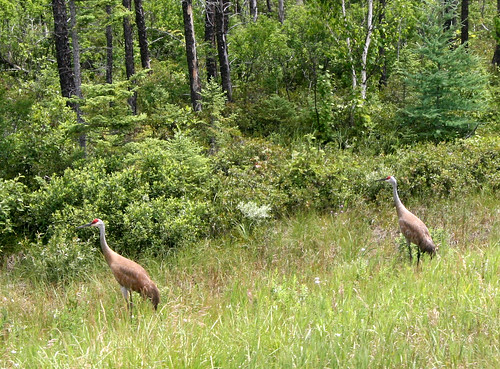
Birdwatching the sandhill Crane, Grus canadensis.
(*photo credit)
January 24, 2014 Choose Hobbies Well
January is National Hobby Month. It is fitting to consider the diversions that allow us to temporarily escape from life's stresses. Balance includes having a healthy hobby that does not overly consume our attention. However, in rare cases, the hobby can become a fulfilling opportunity for budding into a livelihood. Most often, confirmed hobbyists plan ahead, appraise their practice, and share their excitement with others.
Expand hobbies with time. Has anyone assembled a listing of hobbies according to resource use, travel time, and ecological content? Such a list could be similar to our rating of "Green Recreation Activities" two decades ago. Some "hobbies" acquired during normal retirement years become particular callings and may involve public interest environmental issues, volunteering in areas of deep social concern, and assisting in church-related and civic centers. It may be wise to play off of longer-term hobbies where there were social, cultural, or historical ramifications. A hiker may help with a local wildlife survey.
Choose environmentally benign hobbies. In choosing new or expanded hobbies one should minimize resource consumption. The better hobby choices need less travel; e.g. traveling all over the world to expand local birdwatching to distant exotic species is not a green hobby. It is often better that the hobby is of a social nature rather than an individual one, for companionship is a benefit. This is a difficult call because some want a hobby that will take them away from the busy mainstream in which they deal every day. They want to get away and fish or camp or ski. However, individualistic hobbies can be socialized by joining hobby clubs; gardening can include neighbors in work, advice, and sharing produce and information; hiking can involve groups.
Think twice about a collecting hobby. President Franklin Roosevelt, who took stamp collecting seriously, regarded it as a diversion from his massive task as commander-in-chief at the time of war. In my youth, I was an avid stamp collector but later decided that it took too much time and was not something a poor person should be so involved in. I virtually gave away (for $25) the 12,000 stamp collection and later regretted it, for its value could have accrued much over time. But on entering the Jesuits, the stamp-collecting allurement never returned, even though a multitude of beautiful postage stamps are issued daily. Some collectors specialize with collections accruing in value (as most certainly mine must have) and are really budding capitalists.
Perhaps if hobby collectors anticipate donating to a museum or library that will benefit the public at large, there is some redeeming value in this type of hobby. You can share home-grown veggies while you are alive.
Prayer: Lord, give us a grace to decide our hobbies well and,
when possible, for our pleasure and that of others.

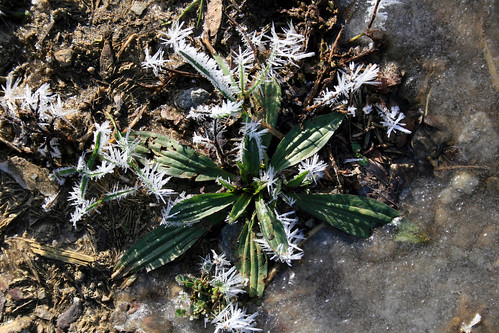
Delicate ice crystals on frosty morning.
(*photo credit)
January 25, 2014 Explore Personal Changes and Life Adjustments
The Feast of St. Paul is a perfect time to recall that this highly talented person abruptly changed his career in midstream. Perhaps many of us are looking for changes as well but prefer not to be struck from a horse -- or while driving. Some lifestyle change suggestions are worth reflecting upon:
* Pray over the matter and start this reflection process prior to making a major commitment, even when financial situations require a rapid change in circumstances. This is an opportune time to become acquainted with The Spiritual Exercises of St. Ignatius, ideally suited for time of profound change. Here the expression festina lente (hasten slowly) becomes more haste but less speed.
* Don't feel that change is a betrayal of parents, friends, teachers, and others who guided you to past careers. In fact, the experience of the past will most likely be a major component of the new option. You are not alone, for some estimate that a majority of working people change their careers in the course of their lives. Early retirees fit this category and often spend more time in the new job after retirement than in the original. People retire earlier, mid-life comes later, and people live longer.
* Take time to assemble a list of options before settling on a final choice. Prayerfully pruning these down by assembling benefits and costs is important. Discern well, or you will otherwise regret the decision. A job counselor may be appropriate as well, if you are quite serious about the new occupation. Even a volunteer position needs discernment, but not as much as for career changes or desire to take up a new vocation.
* Consider a greener environmental position if you have the talent and are drawn to the work. The Earth is under immense assault and the number of experienced people filling key posts is limited. You may also be drawn to a church service position and can actually combine two options into one.
* Before making the final decision, it may be beneficial for you to spend some time at the new location in order to test your compatibility with co-workers. Things may look rosy until you start helping in the nitty gritty tasks at hand and find that grass always seems greener on the other side.
* Try to reveal your decision-making process to confidants who have a good sense of your own talents and spiritual inclinations. They may point out the need to further discern or how one may be blinded by initial impulses. Wise comments are valuable in times of change and ought to be taken seriously. Changes can push or pull or both; come to benefit from past experience. Minimize the stress of change by relying on the Spirit who speaks.
Prayer: Lord, give us discernment and wisdom to know when we must make radical changes, and to be courageous enough to do so.
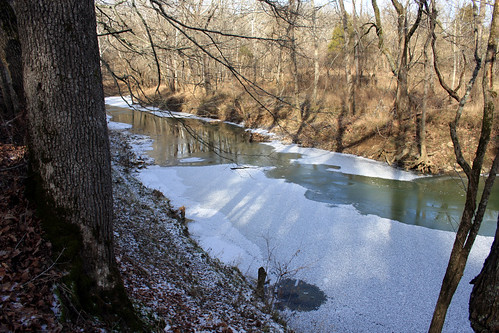
View along Thompson Creek, Mercer Co., KY.
(*photo credit)
January 26, 2014 Motivation and the Unique Call to Serve
January includes the beginning of the "Ordinary" liturgical season, the time of counting the weeks of the year and finding the routines are based on our perseverance and fidelity to our own unique calling. In the gospel reading today we discover the apostles being called to leave all and follow Christ. Their lives engender mixed motivations, and yet the Spirit's call breaks through the shades and shadows of personal fears and imperfections. The Lord's disciples are free beings and can say "yes" or "no" to the Spirit's prompting. Some respond wholeheartedly; others exercise their freedom by suppressing the call. Our hope and prayer is that all who are called find wholeness in going out to others and find service as a balanced motivation.
Material motivation through ubiquitous allurements creates static noise that distracts us to a deeper mission. Those who want to save enough money or other resources to satisfy their own and loved ones' health and retirement needs, have somewhat salutary motives. However, the companion problem to the call is how much is enough. In this age of consumer madness and desire to acquire an ever larger piece of the pie for comfort and security, something in the heart of the material-minded keeps harking about something more. Often the questing soul is disturbed or a conflict arises that shows the futility of solely material goals. Are there limits to material goods and is there something more meaningful in life?
Spiritual motivation touches us at the time that we are called to be perfect, to rise above the material concerns that tend to crowd out the desire to be of service to others who need our help. Self-interest can only go so far; there are only so many new experiences or degrees of comfort. Spiritual calls can break through in thunder, or earthquakes, or waves at sea in the form of whispers. But listening means distancing ourselves from material allurements and hearing the anguishing lament of those suffering. Will we respond in a generous way or decide to postpone this service call? Now is the time to respond; now is the moment of decision. Some will deny the call, excuse themselves as unworthy of it, or escape at least temporarily to other allurements. Others working in trust will respond to the deep down stirring in the listening mind and heart.
Our response is needed for authentic communication. A phone communication includes a sender and receiver. The call is imperfect if no response -- only silence -- awaits the caller. Each generous person wants to respond as fully to life's call from important personages. Freedom to respond is directed to us whether the call finds us at home, on a fishing venture, at a tax collecting table, or any other possible location. The Spirit moves unexpectedly and draws us out of the busyness of everyday life. In crisp January, that call may come to you. What is your response?
Prayer: Lord, give us the time to listen and hear when you
call us to be and to do -- and thus give meaning to our lives.
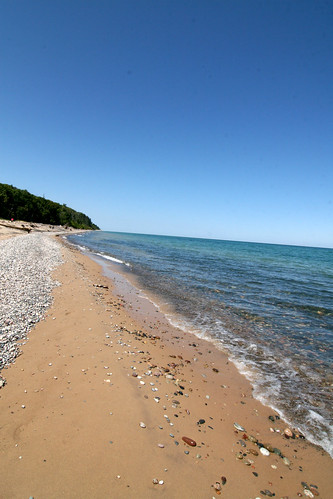
Reflecting by water's edge.
(*photo credit)
January 27, 2014 Reduce Stress and Live a Higher Quality Life
On the birthday of composer of Wolfgang Amadeus Mozart, it is a good opportunity to listen to music as a good way to reduce stress. Balancing the striving to heal our wounded Earth has artistic components such as photography, and can include music-making as well. Other stress-reducing practices include:
* Go outside and take a brisk walk. This outdoor exercise opens the door to fresh air and possible full spectrum sunlight. It is astounding how much the outdoors takes us away from inner pressures that can build up in the claustrophobic surroundings of interior work space. It may be of short duration or a longer three-mile trek an all day walk, or several day hikes.
* Reserve time to merely sit and listen to the natural sounds of nature all around us: birds, wildlife, trees, breezes, and rain. Some of this can be indoor listening.
* Meditate. A prayer or meditation period gives us a sense of presence with the Lord, a period when the past and future is shut out to some degree -- and in spent time and anticipated time we can build up stress. To remain perfectly still and turn our minds to the Lord calms our soul. We say in a word or two that this is the best we can do at this moment -- and that allows the stillness we need in life to penetrate our bones.
Get additional rest and sleep. Too often it is not additional physical activity that can relieve stress as much as obtaining a little more rest than an overly busy life allows. Take an occasional break and even an hour or so afternoon siesta may be what the doctor orders. Some suggest that the time needed to flush the brain's waste materials is why sufficient sleep is necessary -- especially to avoid Alzheimers.
* Confide problems to a friend. Often the need to open oneself to others makes a stressful condition be seen in a new light. Some hold far too much inside themselves when a little more transparency may be a spiritual tonic needed for the desiccated soul. We all need companionship, especially in tough times.
* Spend more time with your hobby. This is more a needed diversion rather than an escape from pressing problems. Allow the creative spirit to flourish in some way.
* Check the weather. If this seems strange, it shouldn't be. Some of us are disquieted by sudden drops in the barometer. That may be more pertinent to those of us affected by abrupt changes in weather patterns, but perhaps we all are affected to some degree. Maybe we ought to be aware when the full moon comes as well.
Prayer: Lord, you give us the gift of life and time to spend it well; do not allow us to mistreat that precious gift through
stresses that we must recognize and reduce where possible.

Spirobolid Millipede, Narceus americanus, protected in a cave environment.
(*photo credit)
January 28, 2014 Be Mindful of Fuel Economy
Certainly with each passing year fuel efficiency becomes a more important consideration in this country. The best way to save fuel is not to use the vehicle itself; just walk or bike for very short trips. Good planning in purchase, maintenance, and operation are still the best fuel economy practices -- and we ought to know how our vehicle is performing. The U.S. Environmental Protection Agency (USEPA) and the Federal Trade Commission (FTC) provide a series of hints that will help with our budget:
* Get a fuel-efficient vehicle. New vehicle choices must regard fuel economy as a major factor. Hybrids and electric vehicles are worth considering as prices become more reasonable.
* Hold to slower speeds. Each five miles per hour one drives over sixty is like paying an additional quarter per gallon for the gasoline. Jump starts and stops are inefficient and yet this is becoming the rule. Unnecessarily idling wastes fuel as well.
Combine trips. The USEPA and FTC say that several short trips taken from a cold start can use twice as much fuel as one trip covering the same distance when the engine is warm. A little planning will go a long way in allowing drivers to combine trips and get more tasks accomplished each time the car is used.
Select the right octane level. This suggestion is more evident to most drivers today because of the high price of fuels. However, some still over-purchase higher octane fuels. Unless the car is knocking, the use of higher octane is a waste of money.
Keep the auto well maintained. Keep the engine tuned and on a regular checkup routine. Keep tires properly inflated and aligned -- this can increase mileage about 3%. Use the recommended grade and type of oil and change on a regular schedule; friction-reducing additives in motor oil can improve gasoline efficiency.
Be wary of "gas-saving" gadgets. The USEPA checked over one hundred commercial fuel enhancers and found very few actually provide any extra efficiency benefits.
Yes, consider fuel alternative vehicles. FTC rules require labels on all new "Alternate Fuel Vehicles" (compressed natural gas, liquefied natural gas, methanol, ethanol E85, biodiesel, hydrogen, propane, electricity) to give the vehicle's estimated cruising range and general descriptive information. Alternative fuels may reduce harmful pollutants and exhaust emissions and assist with national energy independence. The number of stations available for alternatives is growing; in the U.S. during 2011 and 2012 electric vehicle supply equipment availability jumped from 10,000 to 20,000 stations.
Prayer: Lord, help us make travel choices that are mindful of limited world resources and our own financial situations.

Ant explores yucca blossom.
(*photo credit)
January 29, 2014 Champion "Small is Beautiful"
The author of Small is Beautiful, E.F. Schumacher, is regarded by many of us as the father of appropriate technology. My Schumacher ancestors came from the part of Germany where he was born, so I regard him as a distant cousin and feel akin to his way of thinking about small practices. The thesis of his book is that simpler technologies should be championed where they do an adequate task. Why a tractor when a good hoe will do the job in a small plot? Smaller simple technologies cost far less, do not demand a large supporting maintenance system, are people friendly, enhance communities through participative applications, and are generally environmentally benign. Let's reemphasize a number of ways in which beauty is enhanced by smaller...
* House, which is easier to maintain as well as to heat in winter and cool in summer and thus is better suited for people of limited income levels. Currently, half of American homes are too spacious for current number of occupants;
* Meals, for excess food delights can be the cause of obesity and lead to associated illnesses and immobility;
* Hand tools, which are perfect for a small garden where motorized vehicles could compact the soil, and the cost of acquiring and maintaining these devices is beyond the limited income of the gardener;
* Automobile, which can be operated at less expense and will most often prove more efficiency than larger models -- and easier to park and maneuver;
* Wardrobe, which takes less storage space and can be suited to specific and multiple needs at all times, for only fashion and sales will suffer;
* Occupational responsibility, which will allow the person in charge to spend more time with the family and in the development of local social relationships, so important for higher quality and less stressful life;
* Agenda, which permits participants to spend more time in leisure and less under stressful conditions;
* Gatherings, which invite all present to participate in some meaningful manner and not be passive to the words of experts taking all the meeting time;
* Expectations, which open all to be more humble and willing to settle for meaningful actions on their part, along with less chance of disappointments;
* Life expectancy, which permits each person to make the best of each day as though a precious gift from God deserving of true conservation of temporal resources;
* Number of pets, for a multitude would otherwise demand more maintenance resources and feed;
* Roll to play as individuals that will permit others to excel and develop their talents within a vital community; and
* Lawn, which means less maintenance and more space to grow one's garden produce that is fresh, varied, and at less expense.
Prayer: Give us, Lord, a refined sense of simple beauty.

Celebrate the Year of the Horse. Chinese New Year 2014.
(*photo credit)
January 30, 2014 Let's Celebrate Chinese New Year
The firecrackers in a hundred Chinese settlements throughout the nation and world announce the celebration Chinese New Year. Perhaps no other ethnic group is so captivating the minds of Americans at this time. I enjoy reading weekly reflections on "Awakening Green Dragon" by a friend, Alexander Lee, who is teaching English in China and writing informative blogs about customs and cuisine of that grand nation, one of the oldest continuous cultures in the world -- and Chinese are proud of it.
Americans enjoyed the ascendancy of the twentieth century and, if water shortages or civic unrest does not stifle the world's most populous nation, this may be China's century. China's vast population strives to rise from poverty and is succeeding at a very rapid rate through industrialization, urbanization, and a drive to get ahead. Through a certain sense of thrift China has the world's largest financial reserve. However, should Chinese reach our levels of consumption, one wonders whether that nation and world's environment can endure it. Today, China is scouring the world for energy and other resources to meet their insatiable appetite for petroleum, iron ore and minerals of every type. They are going to Sudan, Libya, Gabon, Nigeria, and other African, Latin American, and Asian lands and acquiring Greek port facilities as well.
The Chinese are rapidly acquiring a globalized world view but that may mean picking up some bad habits as well as good -- environmental degradation and especially air and water pollution, a rapidly expanding automobile economy with its congestion, problematic labor relations at home and abroad, rampant consumerism, land development with roads and malls, expanding HIV and AIDS infection, heavy use of tobacco, and a disparity between the urban well off and the rural poor. Although a controlled Communist economy, China winks at some of the Marxist principles of strict equality of the masses. And disparity of wealth emerges.
China has much to celebrate, especially the historic feat of raising six hundred plus million out of poverty over a two-decade period. China has entered the world scene also through UN actions and often acts as mediator in the ongoing South Korean/American dispute with North Korea. The Chinese human rights record has much distance to travel. While freedom is coming slowly to China, we do hope that the Churches are able to function freely and that political prisoners are released and capital punishment abolished -- and that last hope applies to our country as well. Perhaps the desire to be like the rest of the world may help in the Chinese transformation towards a democracy. The hope is that China will soften its stand and permit free exercise of press, speech, and religion. The community of nations ought to be thankful that a strong militarism has not yet developed and may not plague China in the coming years -- we hope, we hope. Happy New Year, China!
Prayer: Lord, may China open its door for those who want to practice openly and in solidarity with others in the world.

Yurt in winter.
(*photo by Sam Mudge, Creative Commons)
January 31, 2014 The Yurt: A Worthwhile Structure
The yurt is a symbol of cultural blending. We blend what we've learned, in this case, from Mongolian culture, with knowledge from our own time and culture. William Coperthwaite
Promoters of appropriate technology (AT) caution that bulk resources (water, food, building materials, and fuel) should be locally obtained, but other AT ideas and applications are welcome from all parts of the world. It takes few transport resources and more creativity to blend distant ideas; it requires sizeable fuel quantities to bring bulk materials long distances. Certainly this AT principle applies to the yurt, a type of housing used in Mongolia, which involves a structure held together like the staves of a barrel and covered with hides or other materials. Often Mongolians take temporary lodgings down and reassemble them quite rapidly, when they travel from place to place with migrating herds.
We built a yurt at ASPI in 1982 and it is still in service after three decades. A platform was built with plywood on treated posts. The siding of this circular building consists of two layers of rough-cut pine boards with insulation between them; the entire structure is held together with a steel cable at the junction of the siding and the eaves of the roof. The Yurt Foundation proposed a roof composed of 23 ribs made of plywood that fit together with a ring at the peak and that includes a skylight as well as clear glass or Plexiglas at the lower end of each rib. The key is constructing the basic building in such a way that the cable holds the walls together. After that, most of the construction is quite simple. While the ribs were attractive, they did not hold up in a wind storm, and so we reconstructed it with interlaced pine slabs covered with tar paper; the roof was sturdy but less scenic.
Yurts serve a variety of applications: lodging, retreats, office work, storage, and temporary shelters. The Mountain Institute in eastern West Virginia <www.mountain.org/blog> has a beautiful double-deck yurt that acts as the nerve center and office of their establishment. The upper floor of this large yurt is a large room for housing interns for short periods of time. The Institute also has a number of smaller yurts on the grounds that serve as storage buildings and cabins for interns.
The ASPI yurt has been used for intern housing even during the winter -- though it is not totally winterized. It has some insulation but does not have a heating stove within it. During the summer, the ASPI yurt has proved to be an ideal retreat cabin and housing for short periods of time. It is surrounded by shade trees and catches a good breeze. It constantly reminds us that yurts can promote themselves when constructed in an attractive manner. Furthermore, yurts can be built rapidly and at very low cost, especially when temporary or even permanent housing is needed.
Prayer: Lord, help us expand our vision and blend the good of other peoples with our own needs closer to home. |